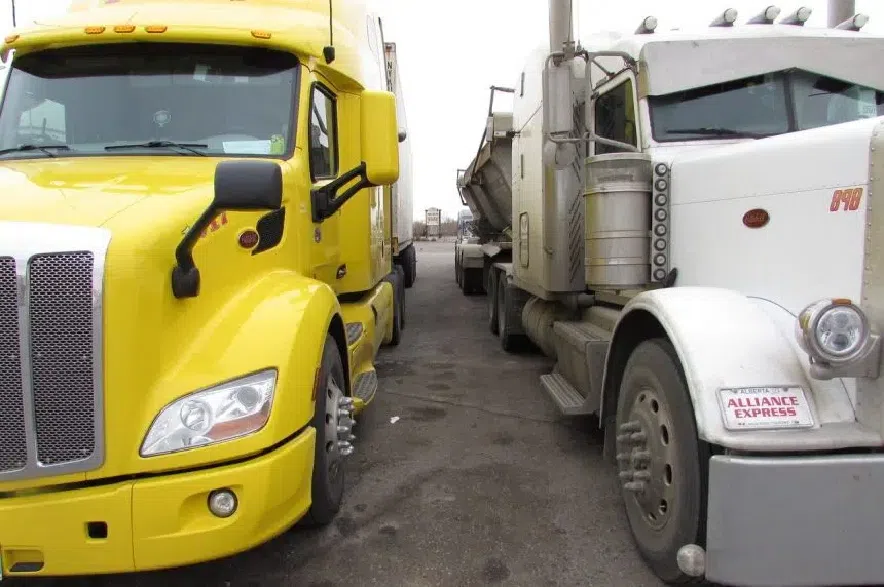While a recent report argued farmers shouldn’t bear the full blame for rising food prices, truckers are also sounding the alarm that inflated costs are not their fault.
Susan Ewart, executive director of the Saskatchewan Trucking Association, spoke with Evan Bray on Friday, and said truckers are going through a challenging time right now.
From labour and equipment shortages to rising fuel costs, Ewart said truckers are having just as hard a time in their industry as producers are.
Like farmers, Ewart said truckers don’t get to set their prices. Tenders go out, bids are made, and truckers accept the payment they receive. Often, she explained, the lowest bids are the ones that win, offering an incentive to the transportation industry to keep profit margins low.
While the higher cost of fuel – as well as costs incurred by shippers and distributors – play a role in formulating bids, Ewart said truckers typically only make a profit of between 2.5 and six per cent.
READ MORE:
- Sask. Trucking Association wants electronic logging devices used
- Sask. roadside rest stops to remain open
- Fuel prices hitting small carriers hardest, trucking association says
That, she said, means truckers are constantly working to manage their meagre profits while ensuring all expenses are met – which has become more difficult with higher expenses in their own industry, including a growing portion going to the federal carbon tax.
In April of this year, Ewart said truckers saw a significant increase in carbon pricing – from $50 a tonne to $65 a tonne – which translated to an increase of about 17 cents of carbon tax payment per litre of diesel fuel.
Ewart said a driver operating a truck with a 300-gallon tank would be paying about $193 more per fill. At an average of about 106 fills each year, Ewart put the cost of carbon tax payments at more than $20,000 annually for each truck on the road.
With Saskatchewan’s trucking industry including lots of small companies with fleets of 10 trucks or less, Ewart said that cost is a very significant one, especially when diesel is an essential in their industry.
“The federal government put a policy in place that is not fair to the transportation industry,” Ewart told Bray. “It’s punishing them, and they have no alternative sources of fuel to use.”
The executive director said the infrastructure and technology is not in place for trucking to move into the next phase of a zero-emissions economy, estimating a move like that is still decades away. She said she doesn’t understand how adding the carbon tax makes sense, especially for Saskatchewan.
“We’re a landlocked province. All of our goods move by truck,” Ewart said.
“If they have trucks sitting in the yard, there’s no return on investment.”
By any measure, she said an extra payment of $200,000 or more by a single company, on top of other taxes, is immense.
She said truckers trying to obtain bids at a price where they are compensated fairly are also facing competition from non-compliant carriers who are cutting rates by using misclassified employees, not remitting taxes, and not awarding appropriate benefits to employees under the Canada Labour Code.
Ewart said the phenomenon has been dubbed “Driver Inc.” She said the industry sees it as a significant problem because of its practice of undercutting rates.
Both the Saskatchewan Trucking Association and the Canadian Trucking Alliance have been working to bring the concerns of people in their industry to government. Ewart said the national association has been pushing back on the carbon tax and zero-emissions policies, while asking for policy fairness.
Sometimes, she said, it feels like truckers are simply being ignored.
“It’s not the most glamourous industry,” she said, “but it’s a necessity that we need in Saskatchewan, and the people who work in that industry are proud to be there (and) take pride in what they do.”
The full interview with Ewart can be heard below.











